Developing Individual, Teams, and Organisations - HR Report
VerifiedAdded on 2020/07/22
|13
|4064
|45
Report
AI Summary
This report delves into the essential skills, knowledge, and behaviors required of HR professionals, using Tesco as a case study. It explores the development of professional plans for specific HR roles, highlighting the importance of communication, negotiation, and policy formulation. The report contrasts individual and organizational learning, emphasizing the need for continuous learning and professional development to ensure sustainable business performance. It also examines the contributions of high-performance working to competitive advantage and employee engagement. Finally, it covers various approaches to performance management, providing a comprehensive overview of key HR functions and strategies.
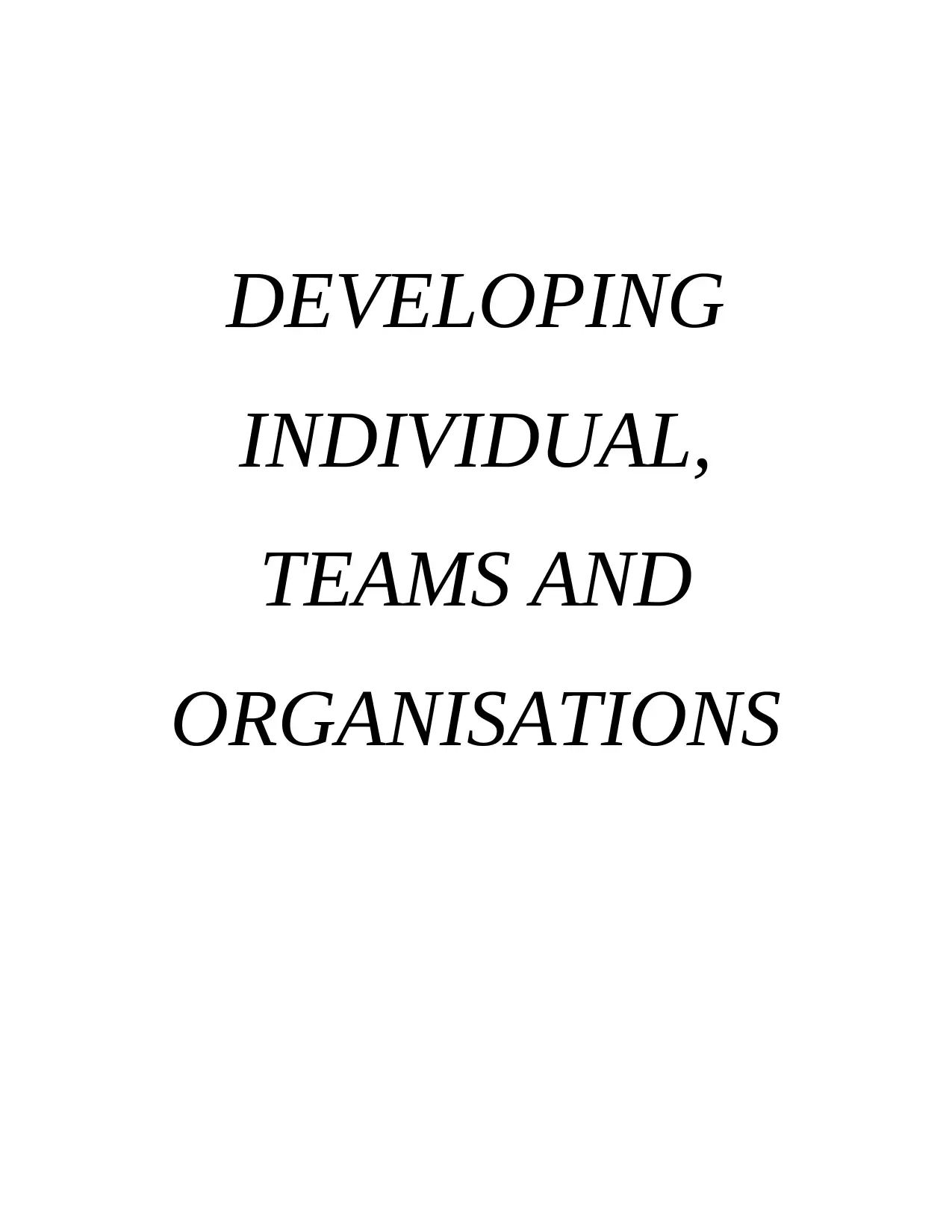
DEVELOPING
INDIVIDUAL,
TEAMS AND
ORGANISATIONS
INDIVIDUAL,
TEAMS AND
ORGANISATIONS
Paraphrase This Document
Need a fresh take? Get an instant paraphrase of this document with our AI Paraphraser
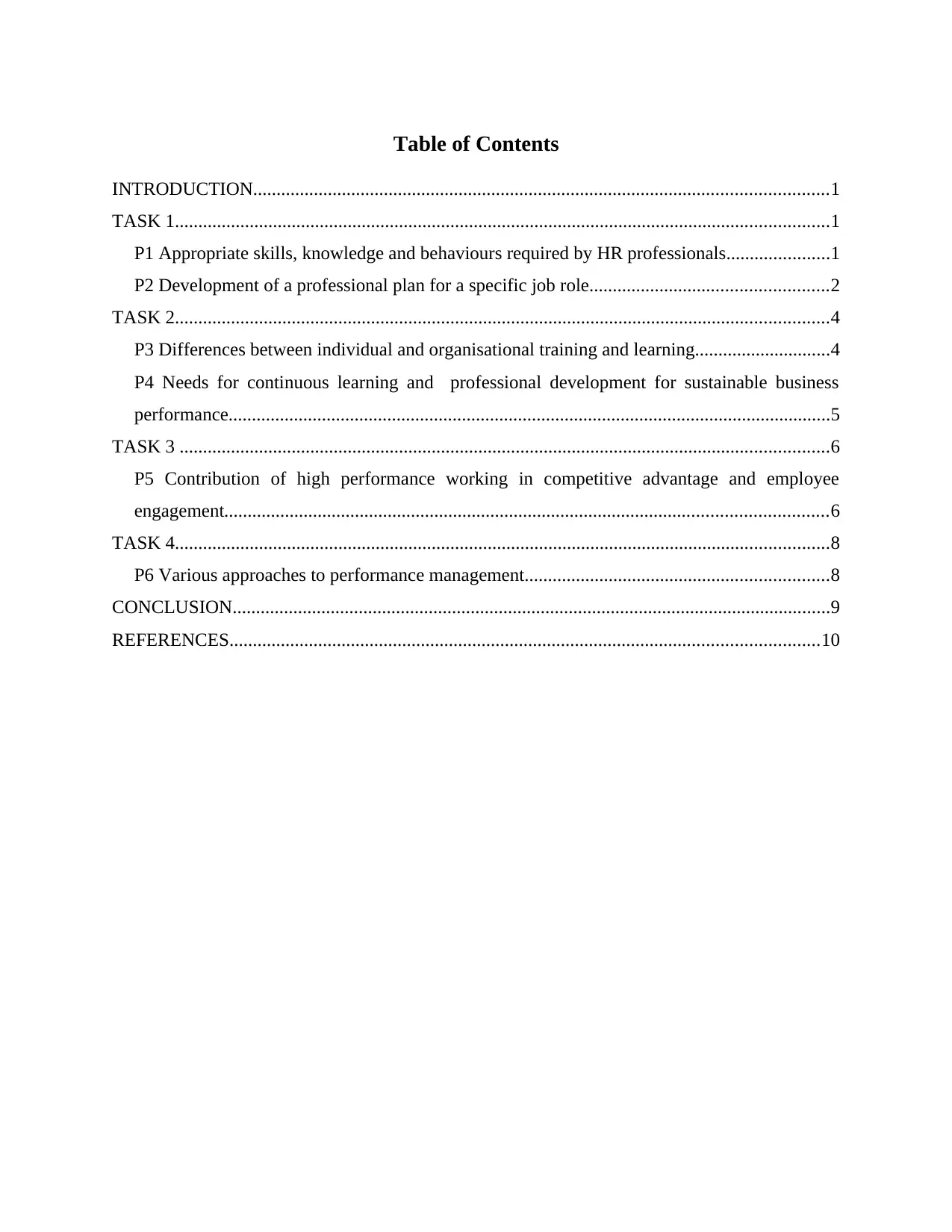
Table of Contents
INTRODUCTION...........................................................................................................................1
TASK 1............................................................................................................................................1
P1 Appropriate skills, knowledge and behaviours required by HR professionals......................1
P2 Development of a professional plan for a specific job role...................................................2
TASK 2............................................................................................................................................4
P3 Differences between individual and organisational training and learning.............................4
P4 Needs for continuous learning and professional development for sustainable business
performance.................................................................................................................................5
TASK 3 ...........................................................................................................................................6
P5 Contribution of high performance working in competitive advantage and employee
engagement.................................................................................................................................6
TASK 4............................................................................................................................................8
P6 Various approaches to performance management.................................................................8
CONCLUSION................................................................................................................................9
REFERENCES..............................................................................................................................10
INTRODUCTION...........................................................................................................................1
TASK 1............................................................................................................................................1
P1 Appropriate skills, knowledge and behaviours required by HR professionals......................1
P2 Development of a professional plan for a specific job role...................................................2
TASK 2............................................................................................................................................4
P3 Differences between individual and organisational training and learning.............................4
P4 Needs for continuous learning and professional development for sustainable business
performance.................................................................................................................................5
TASK 3 ...........................................................................................................................................6
P5 Contribution of high performance working in competitive advantage and employee
engagement.................................................................................................................................6
TASK 4............................................................................................................................................8
P6 Various approaches to performance management.................................................................8
CONCLUSION................................................................................................................................9
REFERENCES..............................................................................................................................10

⊘ This is a preview!⊘
Do you want full access?
Subscribe today to unlock all pages.

Trusted by 1+ million students worldwide
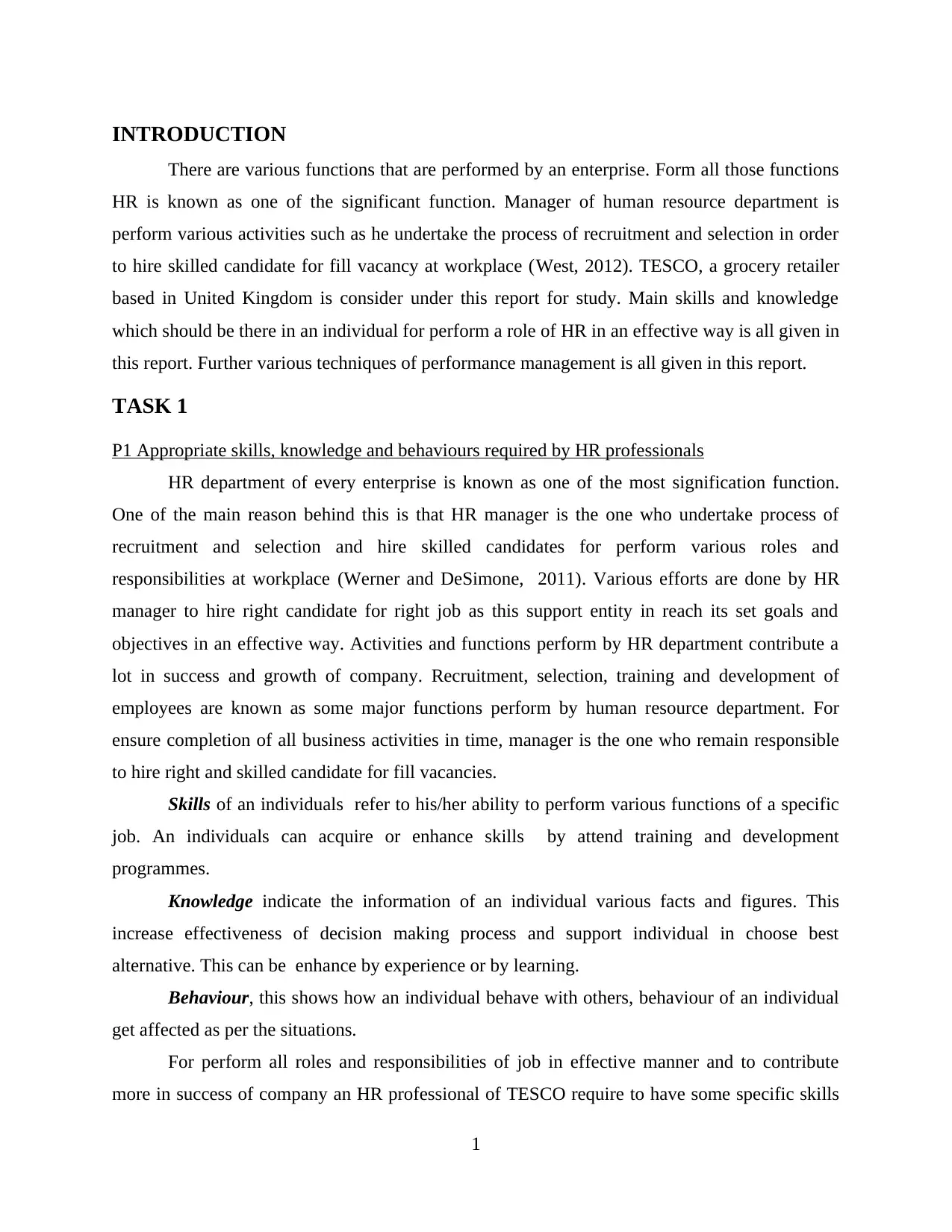
INTRODUCTION
There are various functions that are performed by an enterprise. Form all those functions
HR is known as one of the significant function. Manager of human resource department is
perform various activities such as he undertake the process of recruitment and selection in order
to hire skilled candidate for fill vacancy at workplace (West, 2012). TESCO, a grocery retailer
based in United Kingdom is consider under this report for study. Main skills and knowledge
which should be there in an individual for perform a role of HR in an effective way is all given in
this report. Further various techniques of performance management is all given in this report.
TASK 1
P1 Appropriate skills, knowledge and behaviours required by HR professionals
HR department of every enterprise is known as one of the most signification function.
One of the main reason behind this is that HR manager is the one who undertake process of
recruitment and selection and hire skilled candidates for perform various roles and
responsibilities at workplace (Werner and DeSimone, 2011). Various efforts are done by HR
manager to hire right candidate for right job as this support entity in reach its set goals and
objectives in an effective way. Activities and functions perform by HR department contribute a
lot in success and growth of company. Recruitment, selection, training and development of
employees are known as some major functions perform by human resource department. For
ensure completion of all business activities in time, manager is the one who remain responsible
to hire right and skilled candidate for fill vacancies.
Skills of an individuals refer to his/her ability to perform various functions of a specific
job. An individuals can acquire or enhance skills by attend training and development
programmes.
Knowledge indicate the information of an individual various facts and figures. This
increase effectiveness of decision making process and support individual in choose best
alternative. This can be enhance by experience or by learning.
Behaviour, this shows how an individual behave with others, behaviour of an individual
get affected as per the situations.
For perform all roles and responsibilities of job in effective manner and to contribute
more in success of company an HR professional of TESCO require to have some specific skills
1
There are various functions that are performed by an enterprise. Form all those functions
HR is known as one of the significant function. Manager of human resource department is
perform various activities such as he undertake the process of recruitment and selection in order
to hire skilled candidate for fill vacancy at workplace (West, 2012). TESCO, a grocery retailer
based in United Kingdom is consider under this report for study. Main skills and knowledge
which should be there in an individual for perform a role of HR in an effective way is all given in
this report. Further various techniques of performance management is all given in this report.
TASK 1
P1 Appropriate skills, knowledge and behaviours required by HR professionals
HR department of every enterprise is known as one of the most signification function.
One of the main reason behind this is that HR manager is the one who undertake process of
recruitment and selection and hire skilled candidates for perform various roles and
responsibilities at workplace (Werner and DeSimone, 2011). Various efforts are done by HR
manager to hire right candidate for right job as this support entity in reach its set goals and
objectives in an effective way. Activities and functions perform by HR department contribute a
lot in success and growth of company. Recruitment, selection, training and development of
employees are known as some major functions perform by human resource department. For
ensure completion of all business activities in time, manager is the one who remain responsible
to hire right and skilled candidate for fill vacancies.
Skills of an individuals refer to his/her ability to perform various functions of a specific
job. An individuals can acquire or enhance skills by attend training and development
programmes.
Knowledge indicate the information of an individual various facts and figures. This
increase effectiveness of decision making process and support individual in choose best
alternative. This can be enhance by experience or by learning.
Behaviour, this shows how an individual behave with others, behaviour of an individual
get affected as per the situations.
For perform all roles and responsibilities of job in effective manner and to contribute
more in success of company an HR professional of TESCO require to have some specific skills
1
Paraphrase This Document
Need a fresh take? Get an instant paraphrase of this document with our AI Paraphraser
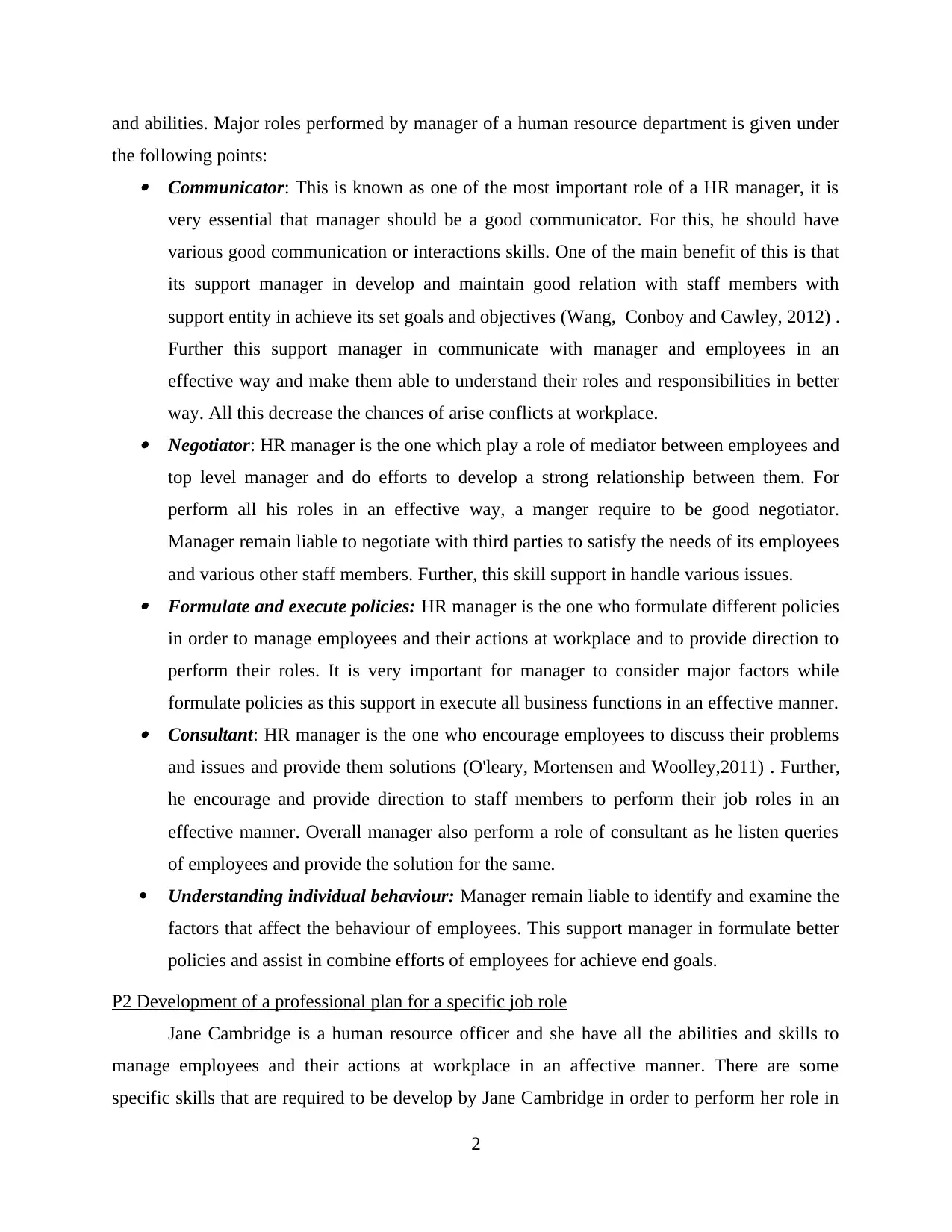
and abilities. Major roles performed by manager of a human resource department is given under
the following points: Communicator: This is known as one of the most important role of a HR manager, it is
very essential that manager should be a good communicator. For this, he should have
various good communication or interactions skills. One of the main benefit of this is that
its support manager in develop and maintain good relation with staff members with
support entity in achieve its set goals and objectives (Wang, Conboy and Cawley, 2012) .
Further this support manager in communicate with manager and employees in an
effective way and make them able to understand their roles and responsibilities in better
way. All this decrease the chances of arise conflicts at workplace. Negotiator: HR manager is the one which play a role of mediator between employees and
top level manager and do efforts to develop a strong relationship between them. For
perform all his roles in an effective way, a manger require to be good negotiator.
Manager remain liable to negotiate with third parties to satisfy the needs of its employees
and various other staff members. Further, this skill support in handle various issues. Formulate and execute policies: HR manager is the one who formulate different policies
in order to manage employees and their actions at workplace and to provide direction to
perform their roles. It is very important for manager to consider major factors while
formulate policies as this support in execute all business functions in an effective manner. Consultant: HR manager is the one who encourage employees to discuss their problems
and issues and provide them solutions (O'leary, Mortensen and Woolley,2011) . Further,
he encourage and provide direction to staff members to perform their job roles in an
effective manner. Overall manager also perform a role of consultant as he listen queries
of employees and provide the solution for the same.
Understanding individual behaviour: Manager remain liable to identify and examine the
factors that affect the behaviour of employees. This support manager in formulate better
policies and assist in combine efforts of employees for achieve end goals.
P2 Development of a professional plan for a specific job role
Jane Cambridge is a human resource officer and she have all the abilities and skills to
manage employees and their actions at workplace in an affective manner. There are some
specific skills that are required to be develop by Jane Cambridge in order to perform her role in
2
the following points: Communicator: This is known as one of the most important role of a HR manager, it is
very essential that manager should be a good communicator. For this, he should have
various good communication or interactions skills. One of the main benefit of this is that
its support manager in develop and maintain good relation with staff members with
support entity in achieve its set goals and objectives (Wang, Conboy and Cawley, 2012) .
Further this support manager in communicate with manager and employees in an
effective way and make them able to understand their roles and responsibilities in better
way. All this decrease the chances of arise conflicts at workplace. Negotiator: HR manager is the one which play a role of mediator between employees and
top level manager and do efforts to develop a strong relationship between them. For
perform all his roles in an effective way, a manger require to be good negotiator.
Manager remain liable to negotiate with third parties to satisfy the needs of its employees
and various other staff members. Further, this skill support in handle various issues. Formulate and execute policies: HR manager is the one who formulate different policies
in order to manage employees and their actions at workplace and to provide direction to
perform their roles. It is very important for manager to consider major factors while
formulate policies as this support in execute all business functions in an effective manner. Consultant: HR manager is the one who encourage employees to discuss their problems
and issues and provide them solutions (O'leary, Mortensen and Woolley,2011) . Further,
he encourage and provide direction to staff members to perform their job roles in an
effective manner. Overall manager also perform a role of consultant as he listen queries
of employees and provide the solution for the same.
Understanding individual behaviour: Manager remain liable to identify and examine the
factors that affect the behaviour of employees. This support manager in formulate better
policies and assist in combine efforts of employees for achieve end goals.
P2 Development of a professional plan for a specific job role
Jane Cambridge is a human resource officer and she have all the abilities and skills to
manage employees and their actions at workplace in an affective manner. There are some
specific skills that are required to be develop by Jane Cambridge in order to perform her role in
2
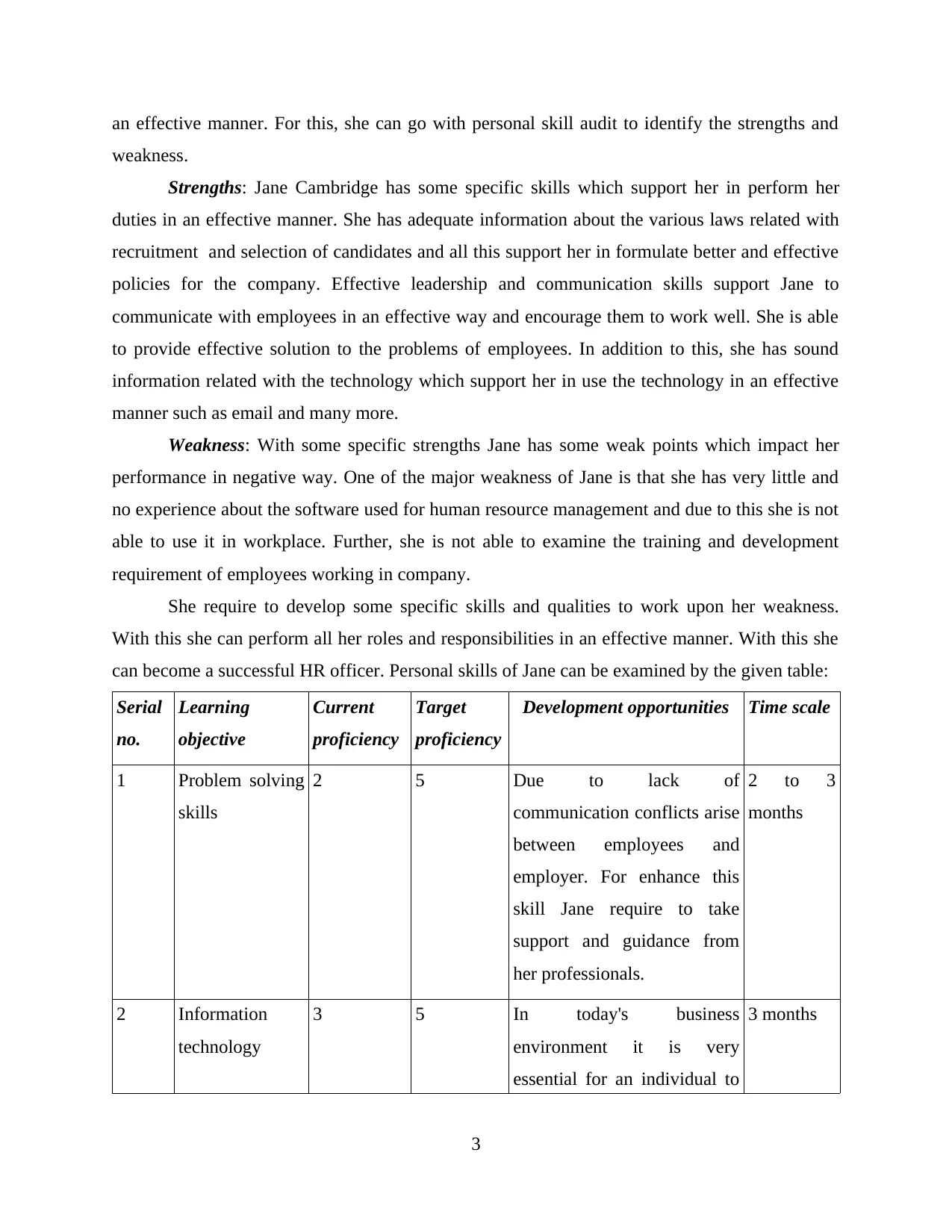
an effective manner. For this, she can go with personal skill audit to identify the strengths and
weakness.
Strengths: Jane Cambridge has some specific skills which support her in perform her
duties in an effective manner. She has adequate information about the various laws related with
recruitment and selection of candidates and all this support her in formulate better and effective
policies for the company. Effective leadership and communication skills support Jane to
communicate with employees in an effective way and encourage them to work well. She is able
to provide effective solution to the problems of employees. In addition to this, she has sound
information related with the technology which support her in use the technology in an effective
manner such as email and many more.
Weakness: With some specific strengths Jane has some weak points which impact her
performance in negative way. One of the major weakness of Jane is that she has very little and
no experience about the software used for human resource management and due to this she is not
able to use it in workplace. Further, she is not able to examine the training and development
requirement of employees working in company.
She require to develop some specific skills and qualities to work upon her weakness.
With this she can perform all her roles and responsibilities in an effective manner. With this she
can become a successful HR officer. Personal skills of Jane can be examined by the given table:
Serial
no.
Learning
objective
Current
proficiency
Target
proficiency
Development opportunities Time scale
1 Problem solving
skills
2 5 Due to lack of
communication conflicts arise
between employees and
employer. For enhance this
skill Jane require to take
support and guidance from
her professionals.
2 to 3
months
2 Information
technology
3 5 In today's business
environment it is very
essential for an individual to
3 months
3
weakness.
Strengths: Jane Cambridge has some specific skills which support her in perform her
duties in an effective manner. She has adequate information about the various laws related with
recruitment and selection of candidates and all this support her in formulate better and effective
policies for the company. Effective leadership and communication skills support Jane to
communicate with employees in an effective way and encourage them to work well. She is able
to provide effective solution to the problems of employees. In addition to this, she has sound
information related with the technology which support her in use the technology in an effective
manner such as email and many more.
Weakness: With some specific strengths Jane has some weak points which impact her
performance in negative way. One of the major weakness of Jane is that she has very little and
no experience about the software used for human resource management and due to this she is not
able to use it in workplace. Further, she is not able to examine the training and development
requirement of employees working in company.
She require to develop some specific skills and qualities to work upon her weakness.
With this she can perform all her roles and responsibilities in an effective manner. With this she
can become a successful HR officer. Personal skills of Jane can be examined by the given table:
Serial
no.
Learning
objective
Current
proficiency
Target
proficiency
Development opportunities Time scale
1 Problem solving
skills
2 5 Due to lack of
communication conflicts arise
between employees and
employer. For enhance this
skill Jane require to take
support and guidance from
her professionals.
2 to 3
months
2 Information
technology
3 5 In today's business
environment it is very
essential for an individual to
3 months
3
⊘ This is a preview!⊘
Do you want full access?
Subscribe today to unlock all pages.

Trusted by 1+ million students worldwide
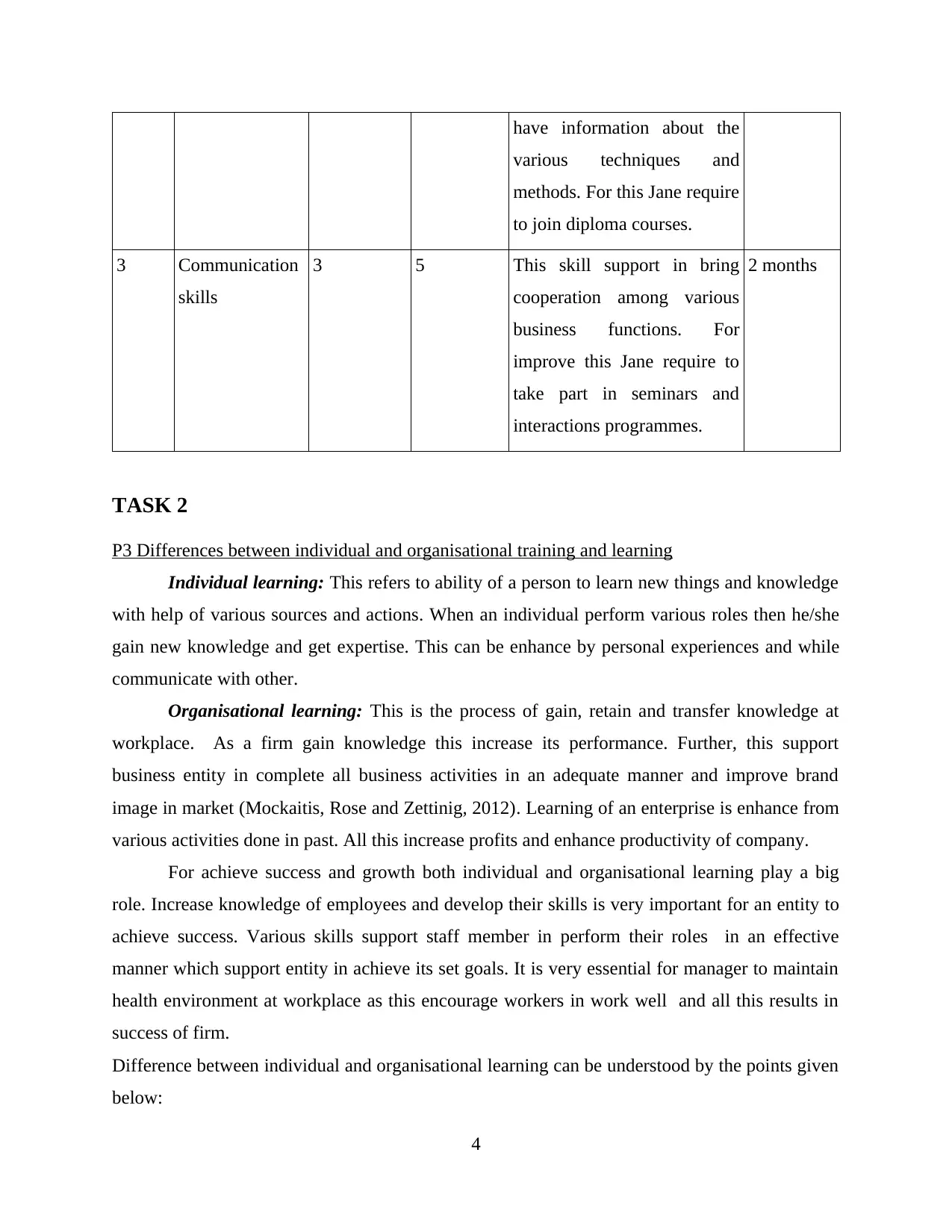
have information about the
various techniques and
methods. For this Jane require
to join diploma courses.
3 Communication
skills
3 5 This skill support in bring
cooperation among various
business functions. For
improve this Jane require to
take part in seminars and
interactions programmes.
2 months
TASK 2
P3 Differences between individual and organisational training and learning
Individual learning: This refers to ability of a person to learn new things and knowledge
with help of various sources and actions. When an individual perform various roles then he/she
gain new knowledge and get expertise. This can be enhance by personal experiences and while
communicate with other.
Organisational learning: This is the process of gain, retain and transfer knowledge at
workplace. As a firm gain knowledge this increase its performance. Further, this support
business entity in complete all business activities in an adequate manner and improve brand
image in market (Mockaitis, Rose and Zettinig, 2012). Learning of an enterprise is enhance from
various activities done in past. All this increase profits and enhance productivity of company.
For achieve success and growth both individual and organisational learning play a big
role. Increase knowledge of employees and develop their skills is very important for an entity to
achieve success. Various skills support staff member in perform their roles in an effective
manner which support entity in achieve its set goals. It is very essential for manager to maintain
health environment at workplace as this encourage workers in work well and all this results in
success of firm.
Difference between individual and organisational learning can be understood by the points given
below:
4
various techniques and
methods. For this Jane require
to join diploma courses.
3 Communication
skills
3 5 This skill support in bring
cooperation among various
business functions. For
improve this Jane require to
take part in seminars and
interactions programmes.
2 months
TASK 2
P3 Differences between individual and organisational training and learning
Individual learning: This refers to ability of a person to learn new things and knowledge
with help of various sources and actions. When an individual perform various roles then he/she
gain new knowledge and get expertise. This can be enhance by personal experiences and while
communicate with other.
Organisational learning: This is the process of gain, retain and transfer knowledge at
workplace. As a firm gain knowledge this increase its performance. Further, this support
business entity in complete all business activities in an adequate manner and improve brand
image in market (Mockaitis, Rose and Zettinig, 2012). Learning of an enterprise is enhance from
various activities done in past. All this increase profits and enhance productivity of company.
For achieve success and growth both individual and organisational learning play a big
role. Increase knowledge of employees and develop their skills is very important for an entity to
achieve success. Various skills support staff member in perform their roles in an effective
manner which support entity in achieve its set goals. It is very essential for manager to maintain
health environment at workplace as this encourage workers in work well and all this results in
success of firm.
Difference between individual and organisational learning can be understood by the points given
below:
4
Paraphrase This Document
Need a fresh take? Get an instant paraphrase of this document with our AI Paraphraser
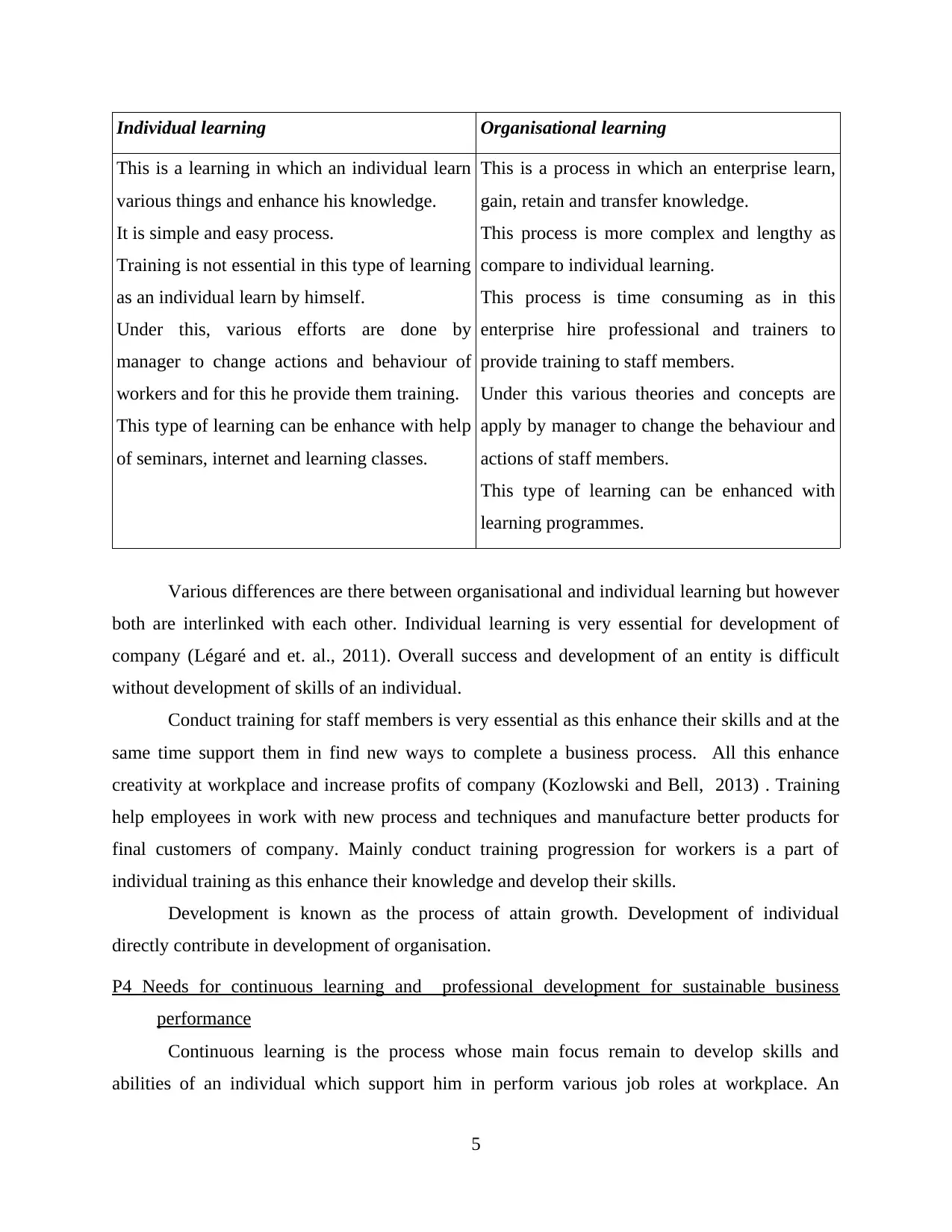
Individual learning Organisational learning
This is a learning in which an individual learn
various things and enhance his knowledge.
It is simple and easy process.
Training is not essential in this type of learning
as an individual learn by himself.
Under this, various efforts are done by
manager to change actions and behaviour of
workers and for this he provide them training.
This type of learning can be enhance with help
of seminars, internet and learning classes.
This is a process in which an enterprise learn,
gain, retain and transfer knowledge.
This process is more complex and lengthy as
compare to individual learning.
This process is time consuming as in this
enterprise hire professional and trainers to
provide training to staff members.
Under this various theories and concepts are
apply by manager to change the behaviour and
actions of staff members.
This type of learning can be enhanced with
learning programmes.
Various differences are there between organisational and individual learning but however
both are interlinked with each other. Individual learning is very essential for development of
company (Légaré and et. al., 2011). Overall success and development of an entity is difficult
without development of skills of an individual.
Conduct training for staff members is very essential as this enhance their skills and at the
same time support them in find new ways to complete a business process. All this enhance
creativity at workplace and increase profits of company (Kozlowski and Bell, 2013) . Training
help employees in work with new process and techniques and manufacture better products for
final customers of company. Mainly conduct training progression for workers is a part of
individual training as this enhance their knowledge and develop their skills.
Development is known as the process of attain growth. Development of individual
directly contribute in development of organisation.
P4 Needs for continuous learning and professional development for sustainable business
performance
Continuous learning is the process whose main focus remain to develop skills and
abilities of an individual which support him in perform various job roles at workplace. An
5
This is a learning in which an individual learn
various things and enhance his knowledge.
It is simple and easy process.
Training is not essential in this type of learning
as an individual learn by himself.
Under this, various efforts are done by
manager to change actions and behaviour of
workers and for this he provide them training.
This type of learning can be enhance with help
of seminars, internet and learning classes.
This is a process in which an enterprise learn,
gain, retain and transfer knowledge.
This process is more complex and lengthy as
compare to individual learning.
This process is time consuming as in this
enterprise hire professional and trainers to
provide training to staff members.
Under this various theories and concepts are
apply by manager to change the behaviour and
actions of staff members.
This type of learning can be enhanced with
learning programmes.
Various differences are there between organisational and individual learning but however
both are interlinked with each other. Individual learning is very essential for development of
company (Légaré and et. al., 2011). Overall success and development of an entity is difficult
without development of skills of an individual.
Conduct training for staff members is very essential as this enhance their skills and at the
same time support them in find new ways to complete a business process. All this enhance
creativity at workplace and increase profits of company (Kozlowski and Bell, 2013) . Training
help employees in work with new process and techniques and manufacture better products for
final customers of company. Mainly conduct training progression for workers is a part of
individual training as this enhance their knowledge and develop their skills.
Development is known as the process of attain growth. Development of individual
directly contribute in development of organisation.
P4 Needs for continuous learning and professional development for sustainable business
performance
Continuous learning is the process whose main focus remain to develop skills and
abilities of an individual which support him in perform various job roles at workplace. An
5
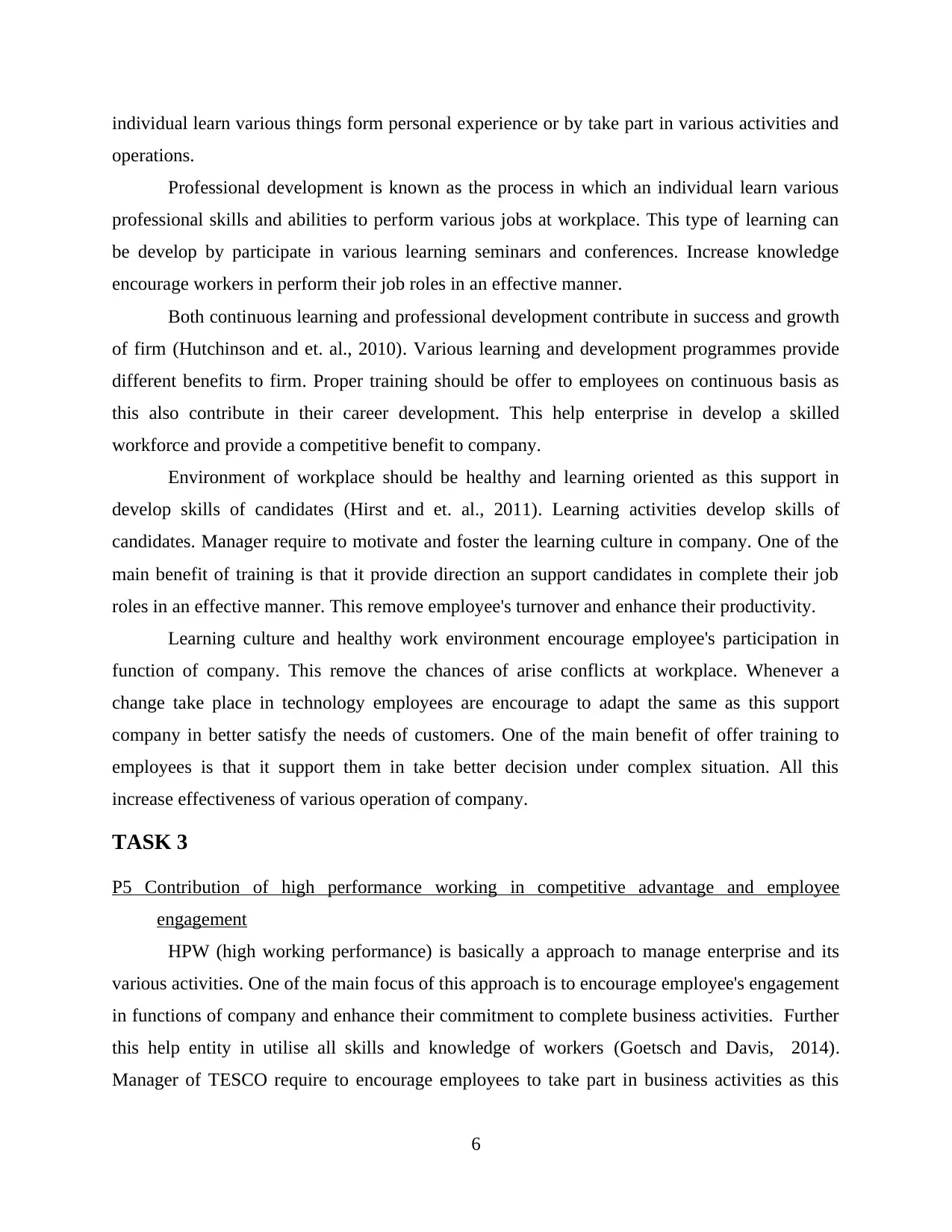
individual learn various things form personal experience or by take part in various activities and
operations.
Professional development is known as the process in which an individual learn various
professional skills and abilities to perform various jobs at workplace. This type of learning can
be develop by participate in various learning seminars and conferences. Increase knowledge
encourage workers in perform their job roles in an effective manner.
Both continuous learning and professional development contribute in success and growth
of firm (Hutchinson and et. al., 2010). Various learning and development programmes provide
different benefits to firm. Proper training should be offer to employees on continuous basis as
this also contribute in their career development. This help enterprise in develop a skilled
workforce and provide a competitive benefit to company.
Environment of workplace should be healthy and learning oriented as this support in
develop skills of candidates (Hirst and et. al., 2011). Learning activities develop skills of
candidates. Manager require to motivate and foster the learning culture in company. One of the
main benefit of training is that it provide direction an support candidates in complete their job
roles in an effective manner. This remove employee's turnover and enhance their productivity.
Learning culture and healthy work environment encourage employee's participation in
function of company. This remove the chances of arise conflicts at workplace. Whenever a
change take place in technology employees are encourage to adapt the same as this support
company in better satisfy the needs of customers. One of the main benefit of offer training to
employees is that it support them in take better decision under complex situation. All this
increase effectiveness of various operation of company.
TASK 3
P5 Contribution of high performance working in competitive advantage and employee
engagement
HPW (high working performance) is basically a approach to manage enterprise and its
various activities. One of the main focus of this approach is to encourage employee's engagement
in functions of company and enhance their commitment to complete business activities. Further
this help entity in utilise all skills and knowledge of workers (Goetsch and Davis, 2014).
Manager of TESCO require to encourage employees to take part in business activities as this
6
operations.
Professional development is known as the process in which an individual learn various
professional skills and abilities to perform various jobs at workplace. This type of learning can
be develop by participate in various learning seminars and conferences. Increase knowledge
encourage workers in perform their job roles in an effective manner.
Both continuous learning and professional development contribute in success and growth
of firm (Hutchinson and et. al., 2010). Various learning and development programmes provide
different benefits to firm. Proper training should be offer to employees on continuous basis as
this also contribute in their career development. This help enterprise in develop a skilled
workforce and provide a competitive benefit to company.
Environment of workplace should be healthy and learning oriented as this support in
develop skills of candidates (Hirst and et. al., 2011). Learning activities develop skills of
candidates. Manager require to motivate and foster the learning culture in company. One of the
main benefit of training is that it provide direction an support candidates in complete their job
roles in an effective manner. This remove employee's turnover and enhance their productivity.
Learning culture and healthy work environment encourage employee's participation in
function of company. This remove the chances of arise conflicts at workplace. Whenever a
change take place in technology employees are encourage to adapt the same as this support
company in better satisfy the needs of customers. One of the main benefit of offer training to
employees is that it support them in take better decision under complex situation. All this
increase effectiveness of various operation of company.
TASK 3
P5 Contribution of high performance working in competitive advantage and employee
engagement
HPW (high working performance) is basically a approach to manage enterprise and its
various activities. One of the main focus of this approach is to encourage employee's engagement
in functions of company and enhance their commitment to complete business activities. Further
this help entity in utilise all skills and knowledge of workers (Goetsch and Davis, 2014).
Manager of TESCO require to encourage employees to take part in business activities as this
6
⊘ This is a preview!⊘
Do you want full access?
Subscribe today to unlock all pages.

Trusted by 1+ million students worldwide
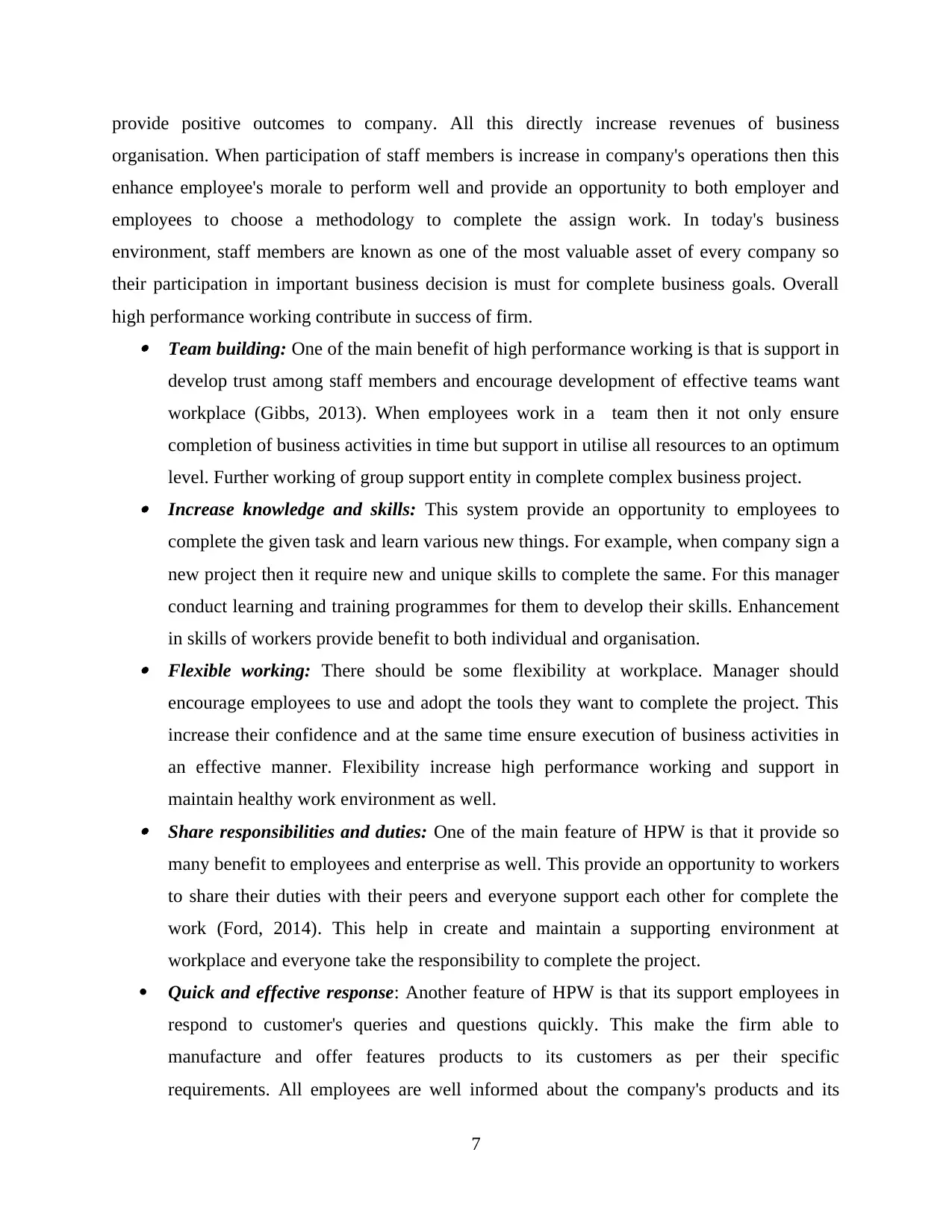
provide positive outcomes to company. All this directly increase revenues of business
organisation. When participation of staff members is increase in company's operations then this
enhance employee's morale to perform well and provide an opportunity to both employer and
employees to choose a methodology to complete the assign work. In today's business
environment, staff members are known as one of the most valuable asset of every company so
their participation in important business decision is must for complete business goals. Overall
high performance working contribute in success of firm. Team building: One of the main benefit of high performance working is that is support in
develop trust among staff members and encourage development of effective teams want
workplace (Gibbs, 2013). When employees work in a team then it not only ensure
completion of business activities in time but support in utilise all resources to an optimum
level. Further working of group support entity in complete complex business project. Increase knowledge and skills: This system provide an opportunity to employees to
complete the given task and learn various new things. For example, when company sign a
new project then it require new and unique skills to complete the same. For this manager
conduct learning and training programmes for them to develop their skills. Enhancement
in skills of workers provide benefit to both individual and organisation. Flexible working: There should be some flexibility at workplace. Manager should
encourage employees to use and adopt the tools they want to complete the project. This
increase their confidence and at the same time ensure execution of business activities in
an effective manner. Flexibility increase high performance working and support in
maintain healthy work environment as well. Share responsibilities and duties: One of the main feature of HPW is that it provide so
many benefit to employees and enterprise as well. This provide an opportunity to workers
to share their duties with their peers and everyone support each other for complete the
work (Ford, 2014). This help in create and maintain a supporting environment at
workplace and everyone take the responsibility to complete the project.
Quick and effective response: Another feature of HPW is that its support employees in
respond to customer's queries and questions quickly. This make the firm able to
manufacture and offer features products to its customers as per their specific
requirements. All employees are well informed about the company's products and its
7
organisation. When participation of staff members is increase in company's operations then this
enhance employee's morale to perform well and provide an opportunity to both employer and
employees to choose a methodology to complete the assign work. In today's business
environment, staff members are known as one of the most valuable asset of every company so
their participation in important business decision is must for complete business goals. Overall
high performance working contribute in success of firm. Team building: One of the main benefit of high performance working is that is support in
develop trust among staff members and encourage development of effective teams want
workplace (Gibbs, 2013). When employees work in a team then it not only ensure
completion of business activities in time but support in utilise all resources to an optimum
level. Further working of group support entity in complete complex business project. Increase knowledge and skills: This system provide an opportunity to employees to
complete the given task and learn various new things. For example, when company sign a
new project then it require new and unique skills to complete the same. For this manager
conduct learning and training programmes for them to develop their skills. Enhancement
in skills of workers provide benefit to both individual and organisation. Flexible working: There should be some flexibility at workplace. Manager should
encourage employees to use and adopt the tools they want to complete the project. This
increase their confidence and at the same time ensure execution of business activities in
an effective manner. Flexibility increase high performance working and support in
maintain healthy work environment as well. Share responsibilities and duties: One of the main feature of HPW is that it provide so
many benefit to employees and enterprise as well. This provide an opportunity to workers
to share their duties with their peers and everyone support each other for complete the
work (Ford, 2014). This help in create and maintain a supporting environment at
workplace and everyone take the responsibility to complete the project.
Quick and effective response: Another feature of HPW is that its support employees in
respond to customer's queries and questions quickly. This make the firm able to
manufacture and offer features products to its customers as per their specific
requirements. All employees are well informed about the company's products and its
7
Paraphrase This Document
Need a fresh take? Get an instant paraphrase of this document with our AI Paraphraser
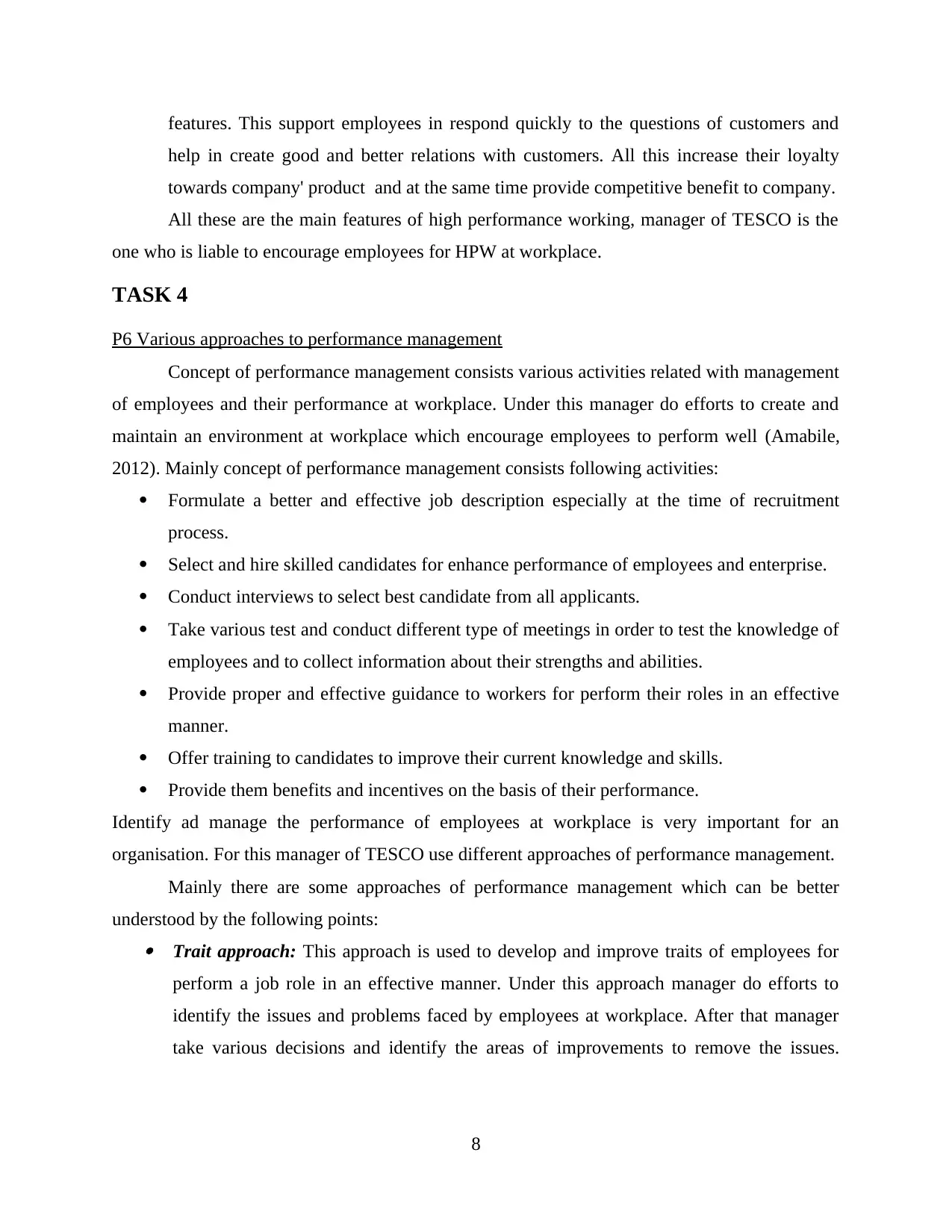
features. This support employees in respond quickly to the questions of customers and
help in create good and better relations with customers. All this increase their loyalty
towards company' product and at the same time provide competitive benefit to company.
All these are the main features of high performance working, manager of TESCO is the
one who is liable to encourage employees for HPW at workplace.
TASK 4
P6 Various approaches to performance management
Concept of performance management consists various activities related with management
of employees and their performance at workplace. Under this manager do efforts to create and
maintain an environment at workplace which encourage employees to perform well (Amabile,
2012). Mainly concept of performance management consists following activities:
Formulate a better and effective job description especially at the time of recruitment
process.
Select and hire skilled candidates for enhance performance of employees and enterprise.
Conduct interviews to select best candidate from all applicants.
Take various test and conduct different type of meetings in order to test the knowledge of
employees and to collect information about their strengths and abilities.
Provide proper and effective guidance to workers for perform their roles in an effective
manner.
Offer training to candidates to improve their current knowledge and skills.
Provide them benefits and incentives on the basis of their performance.
Identify ad manage the performance of employees at workplace is very important for an
organisation. For this manager of TESCO use different approaches of performance management.
Mainly there are some approaches of performance management which can be better
understood by the following points: Trait approach: This approach is used to develop and improve traits of employees for
perform a job role in an effective manner. Under this approach manager do efforts to
identify the issues and problems faced by employees at workplace. After that manager
take various decisions and identify the areas of improvements to remove the issues.
8
help in create good and better relations with customers. All this increase their loyalty
towards company' product and at the same time provide competitive benefit to company.
All these are the main features of high performance working, manager of TESCO is the
one who is liable to encourage employees for HPW at workplace.
TASK 4
P6 Various approaches to performance management
Concept of performance management consists various activities related with management
of employees and their performance at workplace. Under this manager do efforts to create and
maintain an environment at workplace which encourage employees to perform well (Amabile,
2012). Mainly concept of performance management consists following activities:
Formulate a better and effective job description especially at the time of recruitment
process.
Select and hire skilled candidates for enhance performance of employees and enterprise.
Conduct interviews to select best candidate from all applicants.
Take various test and conduct different type of meetings in order to test the knowledge of
employees and to collect information about their strengths and abilities.
Provide proper and effective guidance to workers for perform their roles in an effective
manner.
Offer training to candidates to improve their current knowledge and skills.
Provide them benefits and incentives on the basis of their performance.
Identify ad manage the performance of employees at workplace is very important for an
organisation. For this manager of TESCO use different approaches of performance management.
Mainly there are some approaches of performance management which can be better
understood by the following points: Trait approach: This approach is used to develop and improve traits of employees for
perform a job role in an effective manner. Under this approach manager do efforts to
identify the issues and problems faced by employees at workplace. After that manager
take various decisions and identify the areas of improvements to remove the issues.
8
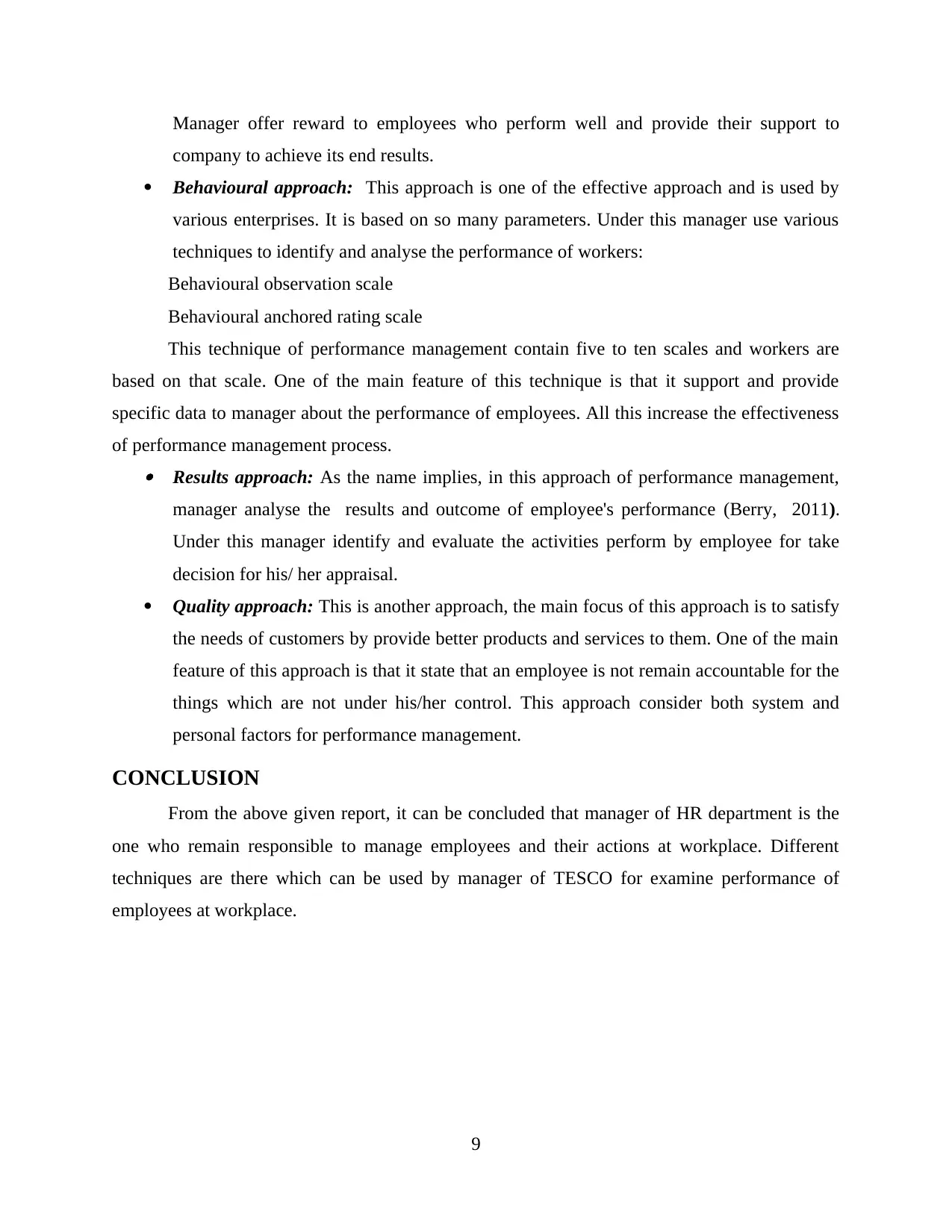
Manager offer reward to employees who perform well and provide their support to
company to achieve its end results.
Behavioural approach: This approach is one of the effective approach and is used by
various enterprises. It is based on so many parameters. Under this manager use various
techniques to identify and analyse the performance of workers:
Behavioural observation scale
Behavioural anchored rating scale
This technique of performance management contain five to ten scales and workers are
based on that scale. One of the main feature of this technique is that it support and provide
specific data to manager about the performance of employees. All this increase the effectiveness
of performance management process. Results approach: As the name implies, in this approach of performance management,
manager analyse the results and outcome of employee's performance (Berry, 2011).
Under this manager identify and evaluate the activities perform by employee for take
decision for his/ her appraisal.
Quality approach: This is another approach, the main focus of this approach is to satisfy
the needs of customers by provide better products and services to them. One of the main
feature of this approach is that it state that an employee is not remain accountable for the
things which are not under his/her control. This approach consider both system and
personal factors for performance management.
CONCLUSION
From the above given report, it can be concluded that manager of HR department is the
one who remain responsible to manage employees and their actions at workplace. Different
techniques are there which can be used by manager of TESCO for examine performance of
employees at workplace.
9
company to achieve its end results.
Behavioural approach: This approach is one of the effective approach and is used by
various enterprises. It is based on so many parameters. Under this manager use various
techniques to identify and analyse the performance of workers:
Behavioural observation scale
Behavioural anchored rating scale
This technique of performance management contain five to ten scales and workers are
based on that scale. One of the main feature of this technique is that it support and provide
specific data to manager about the performance of employees. All this increase the effectiveness
of performance management process. Results approach: As the name implies, in this approach of performance management,
manager analyse the results and outcome of employee's performance (Berry, 2011).
Under this manager identify and evaluate the activities perform by employee for take
decision for his/ her appraisal.
Quality approach: This is another approach, the main focus of this approach is to satisfy
the needs of customers by provide better products and services to them. One of the main
feature of this approach is that it state that an employee is not remain accountable for the
things which are not under his/her control. This approach consider both system and
personal factors for performance management.
CONCLUSION
From the above given report, it can be concluded that manager of HR department is the
one who remain responsible to manage employees and their actions at workplace. Different
techniques are there which can be used by manager of TESCO for examine performance of
employees at workplace.
9
⊘ This is a preview!⊘
Do you want full access?
Subscribe today to unlock all pages.

Trusted by 1+ million students worldwide
1 out of 13
Related Documents
Your All-in-One AI-Powered Toolkit for Academic Success.
+13062052269
info@desklib.com
Available 24*7 on WhatsApp / Email
![[object Object]](/_next/static/media/star-bottom.7253800d.svg)
Unlock your academic potential
Copyright © 2020–2026 A2Z Services. All Rights Reserved. Developed and managed by ZUCOL.




